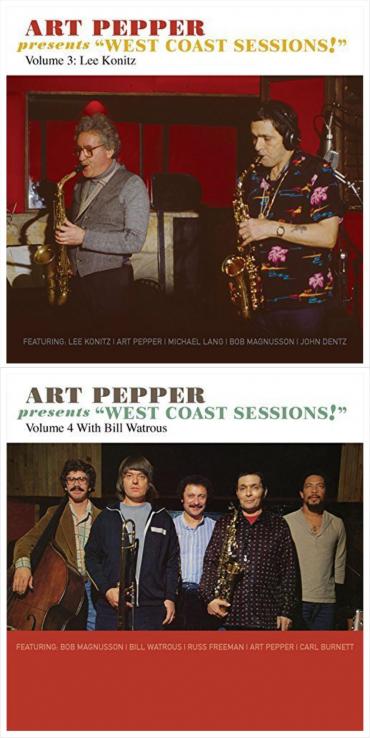
After a gap in the first half of the ‘70s, alto saxophonist and West Coast Jazz icon Art Pepper returned to recording. By decade’s end he was under contract with Galaxy, and when a small Japanese label came calling, he had to get creative. Unable to record for Atlas as a group leader, he picked session leaders and took credit only as a sideman. The albums were issued only in Japan, previously anthologized in the box set Hollywood All-Star Sessions, and are now being reissued by Omnivore with bonus tracks. Volume 3 is headlined by saxophonist Lee Konitz, and was originally released in 1982 as High Jingo; volume 4 is headlined by trombonist Bill Watrous, and was originally released in 1979 as Funk ‘n’ Fun. Both collections include alternate takes mixed from the original multitracks.
Volume 3 finds Pepper and Konitz backed by a hand-picked rhythm section of Michael Lang (piano), Bob Magnusson (bass) and John Dentz (drums). The set list leans heavily on jazz standards, augmented by original pieces from Pepper and Konitz. The disc opens with a breezy take on the Gershwins’ “S’Wonderful,” featuring potent solos from both saxophones, mellower bridges by Lang and Magnusson, and toe-tapping cymbal work by Dentz. Laurie Pepper’s liner notes deftly dissect the differing styles of Pepper and Konitz, with the former coming out swinging from the first note, while the latter building up to his most potent improvisations. By the time they join together at song’s end, Konitz is warmed up, and when he enters on “High Jingo” with a mellower tone, he springboards off of Pepper’s energy.
Paul Chambers’ “Whims of Chambers” cools things down a bit, as Magnusson’s walking bass line starts everyone’s head bobbing, and Lang’s comping provides superb backing for the sax solos. Pepper’s “A Minor Blues in F” includes a fine solo from Lang and an unexpected “a cappella” sax duo in which the band drops away to leave the horns to their own conversation. The set’s ballad, “The Shadow of Your Smile,” finds Pepper on clarinet, ceding the bulk of the soloing to Konitz and Lang. Pepper’s solo on “Anniversary Song” stretches the waltz into more abstract territory before the band returns to the theme, and the set closes with a rousing take on “Cherokee.”
Volume 4 finds Pepper and Watrous joined by Russ Freeman (piano), Bob Magnusson (bass) and Carl Burnett (drums). The label’s suggestion of Watrous was seemingly at odds with their stated desire to record West Coast jazz veterans, but Pepper and Watrous had been gigging together, and Pepper’s longtime association with Freeman, and then-recent gigs with Magnusson and Burnett, made for easy chemistry in the studio. The set opens with a trio of 1930s jazz standards, with fine solos and unison playing, and Magnusson’s fluid bass and Burnett’s drum accents stoking the beat. Pepper takes flight on Cole Porter’s “Begin the Beguine,” and Watrous’ trombone is forlorn and Freeman’s piano introspective on the ballad “When Your Lover Has Gone.”
Watrous’ original “For Art’s Sake” picks up from the ballads in a frenetic mood, and Watrous, Pepper and Freeman all find swinging grooves through the choppy rhythm as they dodge Burnett’s snappy fills. Pepper’s “Funny Blues” is taken at a mellower tempo than the 1956 original, though Pepper is energetic with his runs, and inspires the same in Watrous. The album closes with the oft-recorded mid-40s ballad “Angel Eyes” and Al Cohn’s “P. Town.” Each set includes a 12-page booklets of photos, credits, studio diagrams and liner notes from Pepper’s widow, Laurie. Laurie Pepper has kept the flame of Art Pepper’s music alive through biography, blog and archival releases, and now with this series of reissues, an important chapter in Pepper’s career is revived. [©2017 Hyperbolium]
Art Pepper on Bandcamp and CD Baby




